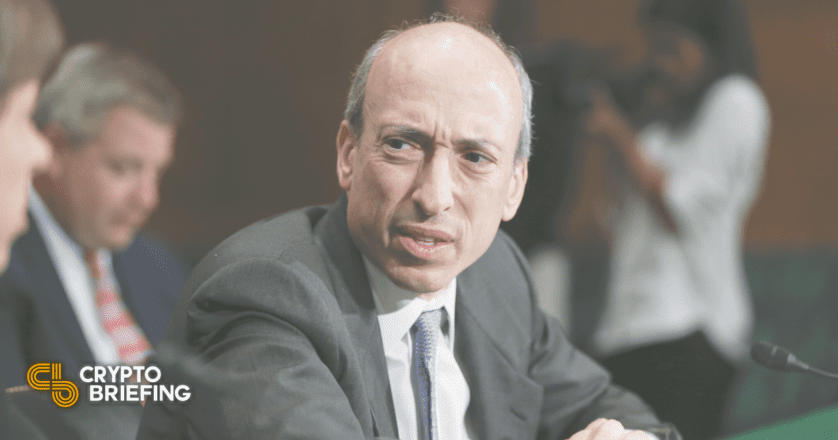SEC's Gensler Tells Warren Regulators Need “Plenary Authority” Over Crypto
Gensler told Senator Warren he wants regulators to have more authority over the crypto space to protect investors.

Key Takeaways
- SEC chair Gary Gensler wrote to Senator Elizabeth Warren to say that he thinks regulators need more power over crypto.
- He says that investors using both centralized and decentralized crypto exchanges are not adequately protected.
- According to the chairman, stablecoins may be used to sidestep anti-money laundering, tax compliance, and sanction provisions.
Share this article
SEC chair Gary Gensler believes lawmakers should focus on crypto trading, lending, and DeFi platforms.
Gensler Seeks More Regulatory Oversight
SEC chair Gary Gensler told Senator Elizabeth Warren regulators should have “plenary” or complete and absolute authority to regulate the crypto market.
On Wednesday, Senator Elizabeth Warren, who’s recently been outspoken about the need to regulate the crypto industry, released a letter SEC chair Gary Gensler wrote in response to her inquiry about the agency’s power to regulate the industry.
“Right now, I believe investors using these platforms are not adequately protected,” Gensler said in the response, pointing to centralized and decentralized exchanges. He added that “the probability is quite remote” that any given crypto exchange operating today has zero securities listed and affirmed that the SEC has and will continue to take their authorities as far as they go, boasting they “haven’t lost a case yet.”
Gensler further expressed concerns to Warren about the growing use of stablecoins on crypto exchanges. He wrote:
“The use of stablecoins on these platforms may facilitate those seeking to sidestep a host of public policy goals connected to our traditional banking and financial system: anti-money laundering, tax compliance, sanctions, and the like.”
Speaking to the American Bar Association in July, Gensler warned that all digital assets, including stablecoins, may fall under the SEC’s jurisdiction if they are backed by securities. The regulator’s comments are especially concerning considering both Tether’s USDT and Circle’s USDC stablecoins are, in part, backed by money market funds, bonds, and commercial paper—assets currently considered securities under U.S. law.
While the SEC is yet to go against stablecoin issuers for potentially violating securities regulations if the agency ever manages to convince the courts that stablecoins are indeed securities, that could spell trouble for the entire DeFi sector. In that case, according to Gensler, decentralized exchanges and lending protocols could also fall under the purview of the SEC. “To the extent that there are securities on these trading platforms, under our laws they have to register with the Commission unless they meet an exemption,” he wrote. “If a lending platform is offering securities, it also falls into SEC jurisdiction.”
Perhaps the most important statement in Gensler’s letter was a call to Congress to give regulators more resources and complete and absolute authority to regulate the crypto markets. He wrote:
“In my view, the legislative priority should center on crypto trading, lending, and DeFi platforms. Regulators would benefit from additional plenary authority to write rules for and attach guardrails to crypto trading and lending […] We also need more resources to protect investors in this growing and volatile sector.“
In a Wednesday statement, Senator Warren, who recently likened cryptocurrencies to drugs and snake oil, expressed satisfaction with Gensler’s response, saying “I’m glad SEC Chair Gensler agrees and has directed the SEC to use its full authority to address these risks, and that he has also identified where additional regulatory authority may need to be granted by Congress.”
It remains to be seen whether Congress will respond to Gensler’s call to action.
Share this article
